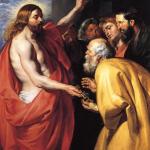
This is one of my many critiques of the book entitled, Roman but Not Catholic: What Remains at Stake 500 Years after the Reformation, by evangelical Protestant theologian Kenneth J. Collins and Anglican philosopher Jerry L. Walls (Grand Rapids, Michigan: Baker Academic, 2017).
*****
Kenneth Collins, in chapter 12 (“Machiavellian Machinations and More: The Later History of the Papacy“), opined:
[T]he Sixth Ecumenical Council, held in 680, had to set the theological record straight by posthumously condemning the likes of Pope Honorius I, who was a rank heretic, given his aberrant christological views. Confused in his theological reflections, which made him especially dangerous since he held a seat of authority, Honorius espoused the monothelite heresy (that Christ had only one will) and thereby failed to distinguish properly the two natures of Christ and what precisely pertained to each.
That’s all well and good, except for fine details (which have not, alas, been a particular virtue of Collins, as I have discovered in ten previous critiques of his book sections). Historians (including orthodox Catholic ones, and other scholars) have many different opinions as to Honorius. Some think he wasn’t personally a heretic at all, but was lax in condemning the heresy (which is arguably the closest to the expressed opinion of the Ecumenical Council of 680). Some think he accepted the heresy. Some think he was merely imprecise in language, guilty of imprudent expression, or confused. Or, various combinations of the above . . . Very few (whatever view among all of these, that they hold) think he proclaimed the heresy ex cathedra. It’s not nearly as simple as merely proclaiming “he was a heretic.”
Readers who want to explore the vexed issue of Pope Honorius in depth may want to consult my summary paper and/or one or more of the following lengthy treatments (allow time for #2 and #3 to upload: one / two / three / four / five / six / seven / eight). In any event, for Ken Collins, it’s clear: Pope Honorius was “a rank [monothelite] heretic.” Period. End of sentence.
How interesting, then, that elsewhere in the book, in chapter 14 (“Protestants in the Crosshairs: Popular Roman Catholic Apologetics“), his co-author, Jerry Walls praises to the skies as one of “the many great Protestant evangelists and apologists whose passionate witness has won countless persons to Christ and has taught them to follow him and to seek holiness” a person who is without question (by his own words) a Monothelite heretic: William Lane Craig. Walls has him right up there with the roster of genuine Protestant heroes (that I also [mostly] admire): Whitefield, Wesley, Spurgeon, C. S. Lewis, and Billy Graham (apparently blissfully aware of Craig’s serious error). Earlier in the same chapter he calls Dr. Craig (along with folks like Calvin, Jonathan Edwards, and Alvin Plantinga) a “notable Protestant” and a “brilliant and learned thinker.”
I first noted this about Dr. Craig on my website over seven years ago: in July 2010, and I wrote to him then (with no reply). It was a very sad thing for me to see, because I had greatly admired his apologetics — especially against atheism — since the early 80s (and still do in many respects). By all accounts he’s a very nice and charitable guy, too. He expressed and espoused the heresy in a Q&A page that is still online on his website (from 9-21-08; I quote it in part):
No earnest Christian wants to be considered a heretic. But we Protestants recognize Scripture alone as our ultimate rule of faith (the Reformation principle of sola scriptura). Therefore, we bring even the statements of Ecumenical Councils before the bar of Scripture. While one disagrees with the promulgations of an Ecumenical Council only with great hesitancy, nonetheless, since we do not regard these as invested with divine authority, we are open to the possibility that they have erred in places. It seems to me that in condemning Monotheletism as incompatible with Christian belief the Church did overstep its bounds. . . .
Some of us, however, consider Monotheletism to be at least a legitimate option for a biblical Christian, not to say to be true. . . .
In the chapter on the incarnation in Philosophical Foundations for a Christian Worldview, I provide a possible model of the incarnation according to which the human nature of Christ becomes complete through its union with the Second Person of the Trinity. Because there is only one person in Christ, there is but one faculty of will, and that faculty serves both the humanity and deity of Christ, exercising itself through both the human nature and the divine nature. So Christ has two complete natures but a single will, just as–and because–he is a single person.
So while I don’t like contradicting the decrees of an ecumenical Council, I think that the danger of falling into Nestorianism is far greater than the danger of falling into Monophysitism. I think we can coherently and biblically be Monothelites without being Monophysites.
Now, the question is: if Honorius was such an evil, wascally character, whose error (whatever it’s nature) was prominently noted in Walls’ and Collins’ book, as an example of the bad popes they clearly relished giving account of, what will they do now, having learned that one of their proclaimed heroes, is definitely guilty of the heresy? If the usual status quo of Protestantism holds, nothing will happen. I noted this seven years ago. I’m not sure many Protestants have consulted Dr. Craig and shown him his errors.
Maybe some have (I sure hope so). But he is still as active as ever today, and Walls and Collins weren’t even aware of this seriously heretical position of his. At least we Catholics condemned Honorius in an Ecumenical Council. What will happen with Dr. Craig? Again; I predict: nothing at all. At worst, he could be kicked out of some Protestant college. He wold simply have to go to one of many others that would gladly hire him. And so it goes in Protestantism: no final say on doctrine; no final authority in serious disciplinary / doctrinal matters of this sort.
I provided many biblical reasons why Monotheletism is false and heretical in my blog post about Dr. Craig.
Dr. Douglas Beaumont was one Protestant scholar who held Dr. Craig accountable for his error in 2010 (he actually mentioned my correction of Dr. Craig in his article). He became a Catholic in 2014.
Dr. Craig also holds two other seriously heretical views, according to Catholic orthodoxy, and also the creeds and confessions of many Protestants (possibly including Walls and Collins):
1) He denies that God is outside of time after the creation (writing, “the proper understanding of God, time, and eternity would be that God exists changelessly and timelessly prior to creation and in time after creation”). That is rank heresy, too, because it means that God can change, which violates the dogma of His immutability.
2) He denies that Jesus is eternally begotten of the Father, which is a denial of what is called the monarchia or principatus of the Father — meaning that the Father is not “begotten”; the Son is, and the Holy Spirit also proceeds from the Father and the Son (filioque). He writes:
Theologically, it seems to me, the doctrine of the generation of the Logos from the Father cannot, despite assurances to the contrary, but diminish the status of the Son because He becomes an effect contingent upon the Father. Even if this eternal procession takes place necessarily and apart from the Father’s will, the Son is less than the Father because the Father alone exists in Himself, whereas the Son exists through another. Such derivative being is the same way in which created things exist. Despite protestations to the contrary, Nicene orthodoxy does not seem to have completely exorcised the spirit of subordinationism introduced into Christology by the Greek Apologists. For these reasons evangelical theologians have tended to treat the doctrine of the eternal generation of the Son from the Father with benign neglect. (Q&A, 10-21-07)
These are all dogmas of the Catholic faith, but, true to form as an evangelical, Dr. Craig appeals to his own (heretical) interpretation of Scripture, which for him trumps any apostolic tradition of the Church; thumbing his nose even at “Nicene orthodoxy.” It’s a prime example of how sola Scriptura can lead to heresy (has no final answer against it): even very serious heresy involving the theology of God: theology proper, and Christology. This is what can and does happen by denying the infallibility of the Church and ecumenical councils.
***
Photo credit: Dr. William Lane Craig: Official Press Release Photo from ReasonableFaith.org (3-13-14) [Wikimedia Commons / Creative Commons Attribution 3.0 Unported license]
***













